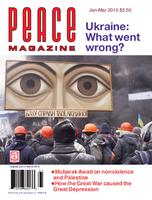
Peace Magazine Jan-Mar 2015, page 4. Some rights reserved.
Search for other articles by Metta Spencer here
You may notice that there is no story about ISIS in this issue. They moved too fast for us—while we were still focusing on Gaza. But our policy about ISIS came from the wisest military analyst of all, Gwynne Dyer, who reminds us:
“Terrorist movements always want you to over-react, SO DON’T DO IT. The terrorists usually lack the popular support to overpower their opponent by force, so they employ a kind of political jiu-jitsu: they try to use the adversary’s own strength against him. Most domestic terrorism, and almost all international terrorism, is aimed at provoking a big, stupid, self-defeating response from the target government….Rule one in the old anti-terrorism doctrine was DON’T OVER-REACT, and it still applies. That means as little bombing as possible, and only of strictly military targets. Preferably, it would mean no bombing at all except in specific areas where ISIS troops are on the offensive. It means not letting yourself be lured into more extreme action by the public beheading of innocent hostages and the other atrocities that ISIS stages to attract a certain kind of recruit. Indeed, it means not launching a major ground offensive against ISIS (for which the troops are not available anyway), and waiting for events to take their course within the ‘Islamic State.’”
The war that has commanded our attention this fall is in Ukraine. We have a long interview with a Ukrainian activist who was captured by the rebels, and who describes his experiences vividly. And we have been talking with Russians who also want to find a solution that all three parties can accept: Ukraine, Russia, and the European Union.
Some of them believe that there are possible grounds for such an agreement. Probably Crimea is the critical factor. Most Russians (probably also most Ukrainians) seem to think that it is non-negotiable. There is no future in which Putin or the Crimeans themselves will reconsider the matter.
Still, some people think that if other agreeable terms were offered, Putin might agree to hold another referendum there—one that would be carried out properly, and the results of which the EU would promise to accept. Then some other possible areas of agreement exist, all of them reasonable:
a) NATO would have to promise never to admit Ukraine as a member;
b) Ukraine would have to be a federation with much local autonomy.
c) Adaptations would have to be made to enable Ukraine to trade with both the EU and the Eurasian Customs Union on favorable terms.
Many peace and democracy activists will strongly oppose these terms, considering them to represent a triumph by Putin, and indeed they would be seen as such in Russia. But NATO is not going to accept Ukraine as a member anyway; if NATO were willing to fight Russia they would have helped Ukraine more already. And the people of eastern Ukraine are fleeing mainly to Russia, not to Kyiv, to escape from the fighting. To retain their loyalty to Ukraine, the state must accommodate the cultural gap that separated their citizens before, and that has widened as a result of this war.

Peace Magazine Jan-Mar 2015, page 4. Some rights reserved.
Search for other articles by Metta Spencer here